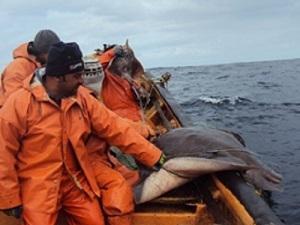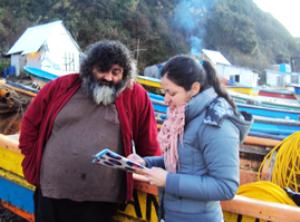Priscila Belén Escobar Gimpel
The project seeks to evaluate the level of cetacean by-catch in artisanal fishing gears around Isla de Chiloe (southern Chile) to propose recommendations and mitigation measures at a local and national level.
Chile has more than 4,000 kilometres of coastline, with 57,000 artisanal fishermen operating near shore. Considering that almost 50% of cetacean species register worldwide are found in Chilean waters and that many of them live or navigate near shore it is necessary to begin this project to evaluate the level of cetacean by-catch in artisanal fishing gears in order to propose recommendations and mitigation measures at a local and national level.

Fishermen during the fishing of manta rays. © Priscila Escobar Gimpel
Other aims of the project include:

Priscila Escobar G. conducting a survey to the fisherman Boris Navarrete. © María José Oetiker
- identify areas where by-catch of small cetaceans occurs the most,
- record cetacean and other marine species taken as by-catch,
- classify fishing gear responsible of cetacean by-catch,
- train observers and fishermen to collect by-catch data,
- promote recommendations generated by the study to adopt conservation measures at local and national level.
The implementation of the project will be a fundamental first step to evaluate the number of dead cetaceans from by-catch in one of the most important areas for cetaceans in Chile, raise public and governmental awareness about an issue that is practically unknown in the country, promote similar projects in sensitive areas for cetaceans along the country and generate recommendations that can later be adopted as part of the whale sanctuary. A schedule to visit the main artisanal fishing communities in Isla de Chiloe has been develop in order to select main areas of work under the project. As we already work with Puñihuil artisanal fishing and tourist community (northwest of Isla Chiloe), the project will start in this area as a pilot experience. To involve, inform and raise the support of other coastal fishing communities, informative material will be produced and distributed during the visits. To prepare artisanal fishermen in data collection, a series of workshops will be conducted.
In order to monitor the incidental catch and collect data, a trained person will go on board artisanal fishing vessels. Additional data will be collected on land. After the analysis of data, a report with the results and recommendations will be produced. These will be socialised with coastal communities and presented to governmental authorities in order to expand the project to other communities and gain support to mitigation measures.
Finally, the success of this first stage of the project will increase confidence of other fishing communities to cooperate. The experience will be replicated on other areas and will allow coordinated efforts at national, regional and international level to mitigate the impacts of by catch.